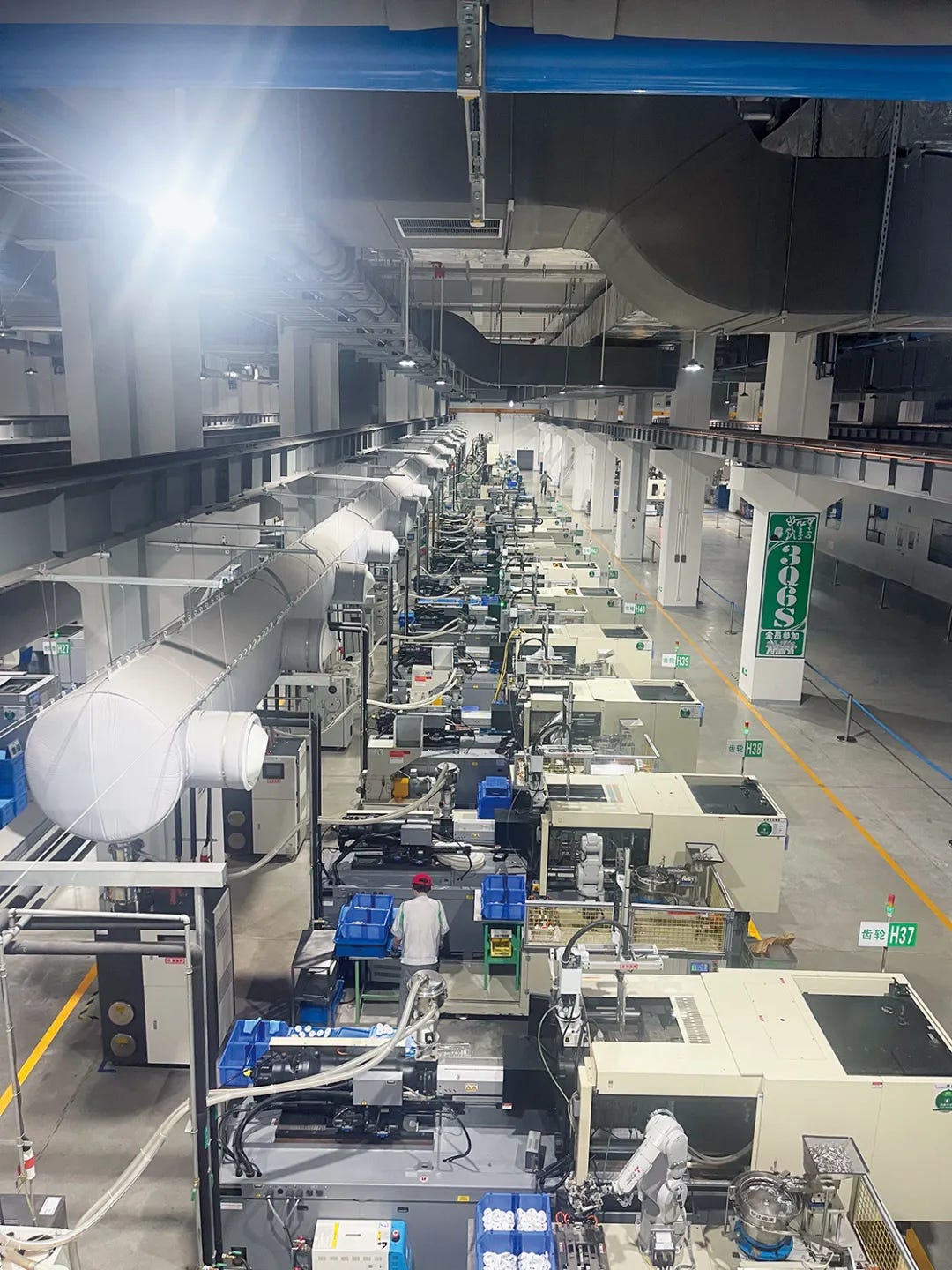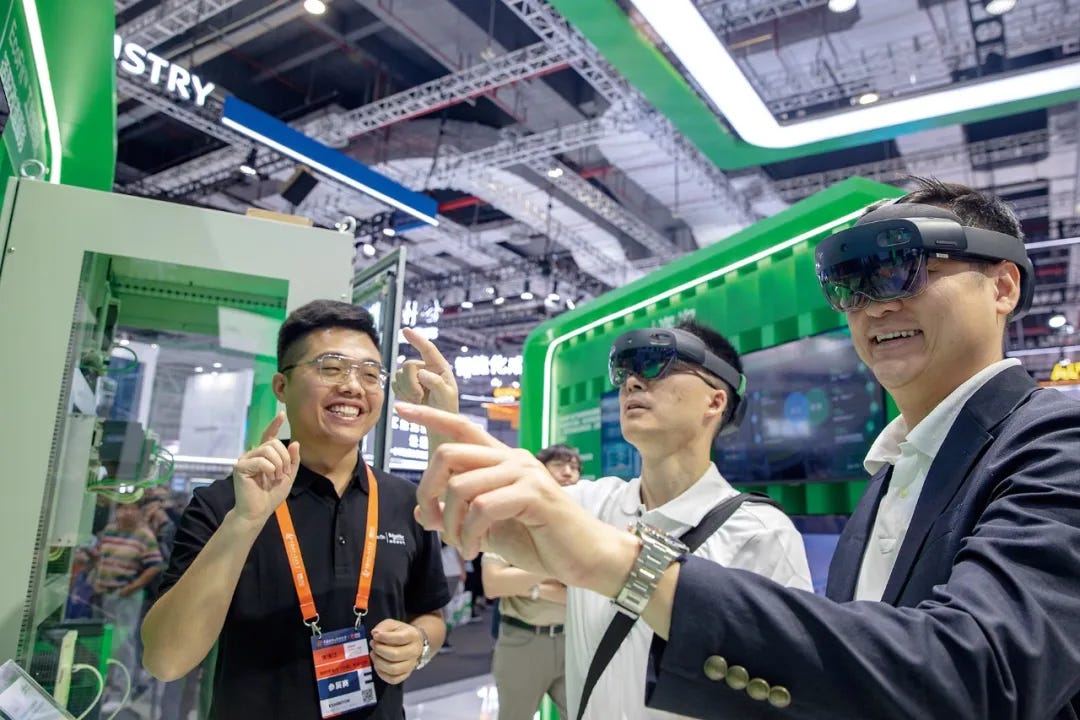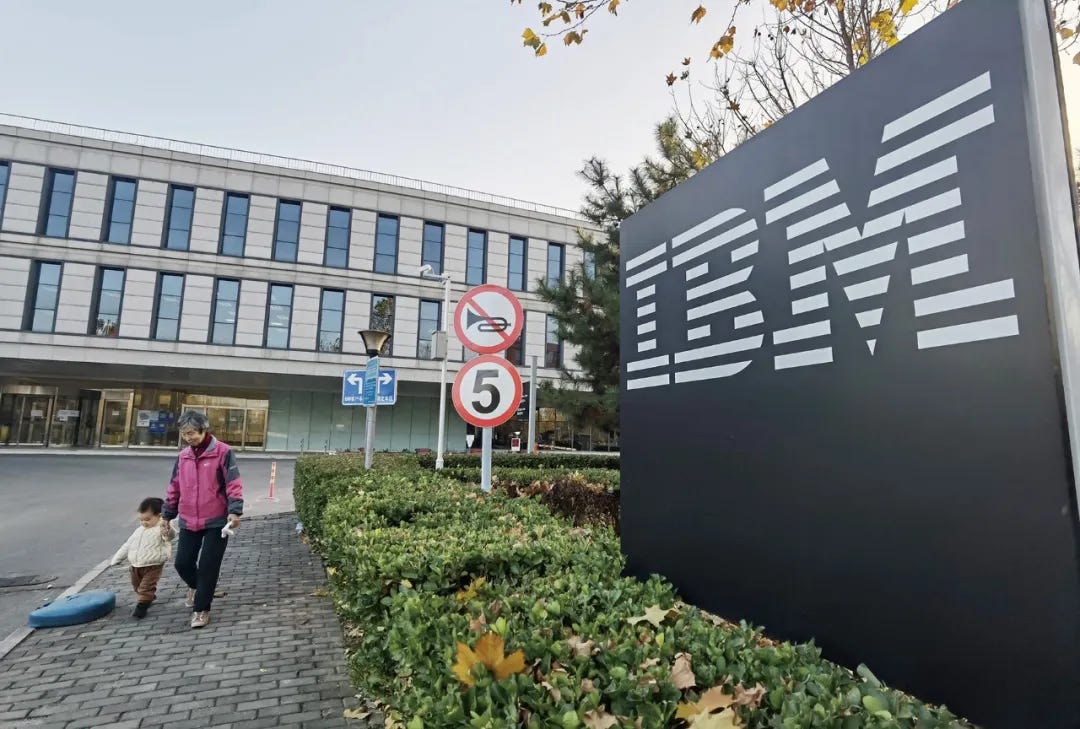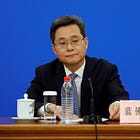How foreign companies' 'easy money' era in China came to an end
Real stories from employees reveal the struggles of foreign companies in China
Working for foreign enterprises has long been a highly sought-after opportunity for Chinese professionals. Securing a job at a foreign company often meant better benefits, improved work-life balance, and exposure to modern, international standards and management practices. However, things have taken a sharp turn since COVID-19.
In 2023, foreign direct investment in China dropped to $163 billion—a 13.7% decline from 2022—marking the second consecutive year of decline and the lowest level in 30 years. Headlines about IBM and Microsoft shutting down or relocating their R&D departments from China only added to the unease. It feels as though the golden era of foreign companies in China has officially ended.
While the challenges and retreat of foreign enterprises became more apparent after COVID, many of them began re-evaluating their China strategies as early as 2015-2016. While it’s easy to blame COVID and geopolitical tensions for their struggles, the reality is far more complex.
To explore this issue further, we’ve selected an insightful article from Southern People Weekly. It shares real stories from employees directly affected by these changes, offering valuable perspectives on why foreign companies are struggling and, more importantly, what their future in China might look like.
At the end of the article, I’ll also share my personal thoughts based on my experience working for both foreign and local companies.
Below is our translation of the original article, titled "裁员频繁、福利倒退、晋升困难:外企人何去何从" (Frequent layoffs, diminished benefits, career hurdles: what's next for foreign firm employees?)".
Frequent layoffs, diminished benefits, career hurdles: what's next for foreign firm employees?
This article was first published in Southern People Weekly
By Chen Yang, reporting from Beijing
"Companies that succeed in transformation don't exit—they reinvest." Swift shifts in China's market have become a common observation among multinational company leaders here. When previously competitive fields show weaknesses or declining demand due to changing internal and external conditions, companies are put to the test: can they quickly pivot, refocus, and seize opportunities in larger or emerging markets?
As Kong Chen sees it, a career crisis often signals that the previous path may have been overly smooth. "Standing on one peak and looking toward the next, you might suddenly find the cable car gone. Perhaps it's a signal to explore a new route. After all, without stepping down, how else can one reach greater heights?"
A tough call
"It's Time."
At 3:08 a.m. on November 1, 2024, Lu Di, restless and unable to sleep, decided to uninstall Slack—the last remaining trace of her over a decade-long career at IBM. Most of her access had already been revoked, leaving only this internal communication tool on her phone. With her official "last day" on October 31 behind her, it was finally time to say goodbye.
On her final day at IBM, Lu wandered the office aimlessly, passing a large display wall. It featured a world map highlighting IBM's global network of development centers, with the phrase "The world is our lab" written in the upper-left corner. Lu posted a photo of the display on social media, adding a caption: "The lab no longer includes China," with a heart emoji at both ends.
The layoff announcement had come two months earlier during an abruptly concluded all-hands meeting. Initially scheduled for 30 minutes, the online call wrapped up in under three.
"This was a tough decision," said Jack Hergenrother, IBM's Vice President of Global Enterprise Systems Development, explaining that IBM was exiting its development operations in China and relocating infrastructure R&D to regions closer to its customers. Consequently, all R&D activities at IBM's China Systems Lab (CSL) and China Development Lab (CDL) would end, affecting over 1,000 local employees in an across-the-board reduction.
According to publicly available information, IBM's remaining strategic R&D locations now include Austin and San Jose in the U.S., Toronto in Canada, Kraków in Poland, Dublin in Ireland, and Bengaluru and Kochi in India. Once IBM's most fully developed market outside the U.S., China is no longer on that list.
Hergenrother attributed the cuts to fierce competition in China's domestic market and a sustained decline in infrastructure business there. IBM's earnings report showed a 19.6% drop in China revenue in 2023, with another 5% year-over-year decline in the first half of 2024.
2024 marks IBM's 40th year in the Chinese market. In its first three decades, IBM thrived by selling servers to the financial and telecom sectors. "One of my former managers left a government job to join IBM 30 years ago, and his monthly salary shot up from 1,000 to 6,000 RMB," recalled Lin Xi, a former IBM employee, in an interview with Southern People Weekly.
Over time, however, IBM's growth in China began to slow. In a 2018 interview with Caijing, then-Chairman of IBM Greater China, Chen Liming, attributed this to the rise of local companies and substantial shifts in the market and regulatory landscape.
In the case of the financial sector, the IOE technology architecture—comprising IBM minicomputers, Oracle databases, and EMC high-end storage—was once regarded as the 'gold standard' for backend systems. But a significant shift occurred in June 2012 when China's State Council issued the 'Several Opinions on Promoting Information Technology Development and Ensuring Information Security,' stressing the need to secure critical information systems and infrastructure networks. This marked a strategic pivot in the financial sector toward prioritizing security and self-sufficiency in IT products.
Apart from the impact of these policy shifts, the high cost and limited bargaining flexibility of international brands, along with rapid advancements in cloud technology, have reduced financial institutions' dependency on the legacy IOE framework. As a result, these institutions gained both the incentive and means to pursue cost-effective domestic alternatives.
"The 'IOE replacement' in China's banking sector has been underway for years. It's a matter of national and institutional security," noted Liu Xiaochun, Vice President of the Shanghai New Finance Research Institute, to Southern People Weekly. "After a decade of progress, domestic technologies are ready to step in. Meanwhile, IOE's technology struggles to keep up with rapid iteration." According to Liu, domestic replacements are reaching a critical stage, and financial institutions will continue to decrease IOE orders.
"IBM's core customer base remains robust in Europe, Southeast Asia, and the U.S., although some domestic business lines have significantly contracted," said Lin Xi, who worked in hardware development and testing at IBM's Beijing office for over ten years before being laid off in early 2024. "In the past, a small team of two or three could handle product deployment from foreign firms. Today, to ensure domestic control, we need large teams of around a hundred people, sometimes even setting up separate subsidiaries. It's a shift that allows internal teams to secure more resources and authority."
Lin noted that even before the layoff wave in September, certain IBM China project teams had been "randomly" phased out. At the time, layoffs seemed "unpredictable" because some groups' products were still performing well both domestically and internationally. But with recent rounds of R&D and testing staff cuts, the rationale has become clearer.
Since Arvind Krishna, IBM's Indian-American CEO, took charge in 2020, he has overseen multiple rounds of layoffs globally, leading Lin Xi to witness several "reorgs" (internal organizational restructurings). Each time she asked a familiar manager about "open positions," the usual response was, "There are no new hiring slots, and even if there were, they'd only be open to applicants from India or Poland." Poland offered lower labor costs and better regional coverage, while openings later focused exclusively on India.
"Many analysts have pointed out that a significant number of Silicon Valley executives, including Krishna himself, are of Indian descent, and that this has been a factor driving IBM's focus on India. Lin finds some truth in this, recalling her experiences with Indian colleagues and observing their strong camaraderie and professional support networks. Still, she doesn't see this as the core reason. 'This is a global competition, plain and simple. Every country is striving to attract and leverage foreign investment to boost its economy. IBM's investment in India today is no different from its commitment to China decades ago; it's about market potential and profitability. From geopolitics to labor costs, time zones, and language, India offers IBM a highly competitive environment.'"
When performance declines, and headquarters reduce investment, a complete exit may be inevitable. However, Lin interprets IBM's sudden and sweeping cutbacks differently, especially in light of recent developments, such as Microsoft offering entire AI teams in China international rotation opportunities. "The company could have continued a gradual, team-by-team layoff approach, or handled it in various ways, yet opted instead for a move that placed them directly in the headlines.'"
The end of 'easy money' days
Over the past two to three years, foreign medical companies have also been swept up in the wave of layoffs.
Jian Ke, who graduated with a Master's degree from Peking University's School of Medicine in 2015, spent nearly a decade working for three foreign medical companies. Currently, she is in the marketing department of an American enterprise.
In Jian Ke's view, foreign medical companies in China have generally struggled in recent years, primarily due to the national "volume-based procurement" policy. This policy, piloted in 2018 and expanded nationwide the following year, focuses on "lowering prices in exchange for volume." It aims to reduce the gray market for drugs and medical supplies, easing the financial burden on both public healthcare and individuals.
As of August 2024, nine rounds of national centralized drug procurement have involved 374 types of medication, with an average price reduction exceeding 50%. High-value medical supplies such as coronary stents, artificial joints, and orthopedic spine implants saw even more dramatic price cuts, with reductions averaging 82%. For instance, the average price of coronary stents plummeted from around 13,000 RMB to approximately 700 RMB.
Faced with these conditions, some foreign companies, particularly those with significant market share in public hospitals, have been forced to drastically reduce the prices of their original branded drugs and medical supplies to maintain market presence. Others, expecting that volume growth wouldn't offset the steep price cuts, or preferring to maintain global price consistency, chose not to follow suit. With the tenth round of drug procurement approaching, the government is further refining its policy design to better meet the original goals of the program. Regardless of their choice, multinational companies are now adjusting their strategies across pricing, market positioning, asset allocation, and organizational structure.
"Abandoning bids means conceding the market, and losing a bid can lead to a rapid market exit. Some smaller foreign firms, if they fail to win bids for all their products, may be forced to divest their assets and leave China. Larger companies, on the other hand, may resort to strategic contraction, focusing on core products and shedding non-winning product lines. Even if they win bids at a reduced price, their leading market share faces the risk of being split. A steep price reduction could significantly drag down performance. After winning a bid, companies typically reduce marketing efforts, consolidating such businesses under domestic management or transferring them to local agents. What used to require a team of two hundred people to manage one product will likely result in massive layoffs after a bid win," Jian Ke explained.
For a long time, Jian Ke's business lines held a leading position in their category. Now, however, the previously profitable structure has been disrupted, and the days of 'easy money' are gone. While one of her company's products was selected in the centralized procurement process, the bidding price was far from ideal, and business volume has shrunk to a third of its previous level. Many colleagues are already updating their resumes, bracing for a negative result.
Jian Ke can clearly feel that while the work pace at foreign companies remains relatively relaxed compared to local firms, the increasing competition in the Chinese market is pushing some foreign medical enterprises to "work harder." Department heads, under pressure to meet targets, now report their teams' "battle results" every morning in the company's WeChat group, complete with rankings.
Performance targets have become more difficult to meet, which has directly impacted employee benefits. Jian Ke's company used to hold annual meetings abroad, with destinations including Japan, South Korea, and Australia. However, in recent years, the venues have moved closer, with events now being held in Hong Kong, Macau, or nearby mainland cities. Some departments with poor performance have not held annual meetings for years. Salary increases have also slowed, dropping from 10% annually to just 5%. Promotions have become more challenging, with some departments even downgrading positions. "The company doesn't worry about you leaving anymore because everyone knows there are few good opportunities outside," Jian Ke said.
The trend of large-scale layoffs in the medical industry, driven by a strategy of cutting costs and improving efficiency, has been ongoing in recent years and is not limited to China. Other subsidiaries of the U.S.-based medical company Jian Ke works for are also experiencing workforce reductions. In early October 2024, global healthcare giant CVS Health announced it would cut approximately 2,900 jobs across the U.S., primarily in corporate functions. The layoffs are attributed to "ongoing market turbulence, regulatory pressures, and changing consumer demands and expectations." As part of its restructuring plan, CVS had already eliminated about 5,000 positions in 2023.

Older than Jian, Shu Xin has worked for a Japanese construction machinery manufacturer in Hebei for 15 years, witnessing the end of the "easy money" era for foreign enterprises.
This Japanese company, a globally recognized leader in construction machinery, is known for its high-end excavators and asphalt pavers. During its peak years in China, driven by the booming real estate market, friends would often ask Shu, then head of quality control, to assist in purchasing machinery. However, instead of simply facilitating the process, she found herself urging the factory to increase production, as "too many customers were waiting for machines that couldn't be sold fast enough."
Today, although the U.S. and Japanese brands still hold an unshakable position globally due to their quality, technical expertise, and innovation, Chinese brands have steadily expanded their share of the domestic excavator market, from 7% in 2001 to 86.8% in 2023.
In Shu's view, this highlights the narrowing performance gap between domestic and foreign brands in the construction machinery sector. Chinese products are rapidly evolving, offering a competitive mix of functionality, quality, and strong value for money across a wide range of applications. At the same time, overcapacity has pushed many domestic brands, lacking differentiated competitive advantages, to adopt low-price strategies in a bid to capture market share. Against the backdrop of an economic slowdown, this also caters to the increasing demand from price-sensitive customers looking to reduce costs and enhance efficiency.
As market dynamics evolve and competition within the mature sector grows fierce, foreign brands are adapting accordingly. Shu observes that some Western construction machinery brands have responded by lowering prices. To manage costs without compromising quality standards, these companies have adjusted product specifications—reducing equipment weight (e.g., from 10.5 to 10.1 tons) or removing certain features. However, the Japanese company where Shu worked has refrained from price cuts, as its domestically manufactured products are exclusively for the local market. Given the high inventory and production now at a fraction of its peak, price reductions are considered impractical.
The construction machinery industry is characterized by cyclical demand. Shu has witnessed previous market downturns, notably around 2014, when slowing GDP growth and a prolonged deceleration in fixed-asset investment, especially in real estate, led to a dip in demand. Since the industry entered a new downturn in late 2021, however, this extended low has persisted beyond the Japanese company's expectations, with no clear end in sight. "Without real estate recovery, construction machinery won't bounce back," she notes. In contrast, the company's Japanese headquarters saw record revenues in 2023, marking its highest sales in 40 years.
Cross-border investment aims to diversify risk, optimize resource allocation, and pursue new growth opportunities. The dynamic adjustment of global business operations is a result of market forces at play. With China's construction machinery market becoming increasingly saturated, domestic brands are also looking abroad for growth. Public data shows that 13 Chinese companies are now ranked among the world's top 50 construction machinery manufacturers, with 44.24% of their combined revenue from overseas sales. The profitability of many Chinese companies in 2023 was largely driven by international expansion.
The Japanese company where Shu works cannot export products from its Chinese factories and can only fill orders when production falls short at headquarters. In 2023, due to continued declines in output, the company began downsizing its production lines, offering severance of "N+4"(4 months of salary) plus an additional bonus—the first layoff since it established the Hebei plant over a decade ago.

Endless overtime, inundated with orders
In Dalian, Da Shan, like Shu Xin, works at a foreign manufacturing firm and has experienced two very different sides of the job market.
Recently, two of his friends received "N+3" severance packages after being laid off from IBM's Dalian division, where they managed Japanese operations in finance and programming. As outdoor enthusiasts, they used to enjoy weekends with minimal overtime—a lifestyle Da Shan had once envied. While he often missed weekend hikes in favor of lucrative overtime, today, his newly unemployed friends crave steady jobs, seeing overtime as "opportunities" and signs of economic health and growth.
The Japanese-owned company where Da Shan works, specializing in electric motors, commands a dominant share in the global market with its flagship products. As a CNC robot maintenance worker, his role is vital in minimizing downtime on the automated production line, enabling the "lights-out" factory to operate around the clock. "Orders are endless," Da Shan says, regularly working overtime to meet demand.
Established in Dalian in the early 1990s, the company initially produced motors for household electronics. In recent years, it shifted to manufacturing key motor components for electric vehicles, including sunroof, seat, brake, and transmission assist motors. Buoyed by the growth potential of China's new energy vehicle market, it committed an additional $1 billion in 2020 to expand production and build an R&D center in Dalian capable of housing a thousand employees.

According to publicly available data, Japan was China's third-largest foreign investor in 2023, with 888 newly established Japanese-owned enterprises, marking a 7.3% increase year-on-year. Dalian, one of the earliest cities to attract Japanese investment, now hosts over 5,000 Japanese companies, with total investments nearing $20 billion as of April 2024. The 5th China-Liaoning International Investment and Trade Fair, held in Dalian at the end of September 2024, further highlighted the robust trade relationship between Liaoning and Japan.
As a local resident of Dalian, Da Shan feels the city's increasing efforts to attract and leverage foreign investment. Although, as a frontline worker, he's not privy to his company's global strategy, his long-standing experience in the industry has given him his own insights into the rise and fall of foreign enterprises in the area. In his view, his company's success is largely due to its successful transformation in recent years, with demand for its products still outstripping supply.
The rapid pace of change in the Chinese market is a shared consensus among many leaders of multinational companies in China. When traditionally competitive sectors face shortcomings or a drop in demand due to changes in internal and external conditions, companies are challenged to adjust their strategies quickly and focus on seizing larger or more emerging market opportunities.
Da Shan recalls the closure of Toshiba's plant in Dalian, which had attempted a similar pivot into motor production but ultimately lagged behind market trends. "They didn't succeed in transitioning. Lacking a technological edge or cost advantage, Toshiba products lost market relevance, leading to its exit from Dalian," Da Shan explains.
In his view, foreign enterprises are not only facing competition from Chinese firms. "After Toshiba's exit, our company, along with Japanese giants like Mitsubishi Electric and Mabuchi Motor—both large Japanese manufacturers employing tens of thousands in China—are still fiercely competing for market share."
A report released in July 2024 by the Japan Chamber of Commerce and Industry in China, titled China's Economy and Japanese Companies 2024 White Paper, indicated that 56% of Japanese companies in China plan to either expand or maintain their investments—a 3% increase from the same period in 2023. According to Wu Jianghao, China's ambassador to Japan, Japanese companies enjoy higher returns in China than in other markets. He cited data from early 2024, noting, "The average return on foreign direct investment in China over the past five years has been around 9%, while Japanese companies achieved an 18% return in 2022."
"Companies that have successfully adapted aren't pulling out—they're investing more," Da Shan notes. Near his workplace, a major Japanese ceramics manufacturer recently began construction on a new $300 million facility, with the first phase set to complete in 2025. Public data shows this manufacturer has long held a top position in China's high-end bathroom market. Although its profits in China fell by nearly 40% in 2023, revenue from the mainland still accounted for 13% of its global total.

In recent public statements, company leadership noted that the new Dalian plant will help maintain localized production while supporting compliance with China's tightened energy efficiency and environmental standards, especially as residential and commercial zones grow around its original Beijing facility. This expansion reflects the company's strong confidence in the potential of the Chinese market.
Like Shuxin's industry, the bathroom market is also impacted by the slowdown in China's real estate sector. While it's hard to predict when demand for residential fixtures will recover, the company is confident in the growth potential, noting that over 100 million homes in China's first- and second-tier cities are more than a decade old and now entering a renovation phase. The significance of the Chinese market is undeniable.
From 2013 to 2022, China's foreign investment steadily increased for ten consecutive years, surpassing 1.2 trillion yuan in 2022. However, amid global economic slowdowns, rising debt risks, and geopolitical uncertainties, foreign investment began to fluctuate in 2023, following a high base. According to data from the Ministry of Commerce released in July 2024, while foreign investment remained high in the first half of 2024, it dropped by 29.1% year-on-year. Over the past year, China has introduced policies such as the "24 Measures for Foreign Investment" and "New 24 Measures for Foreign Investment," with multiple high-level meetings emphasizing the need for comprehensive strategies to attract and stabilize foreign investment.
In April 2024, Zhang Ming, Deputy Director of the Institute of Finance at the Chinese Academy of Social Sciences, published an article discussing how to better stabilize foreign investment. He categorized the foreign direct investment flowing into China into two types: the first type targets the domestic Chinese market directly, and the second type treats China as a processing and assembly base for products exported globally.
Zhang believes that, over the past four decades since China's opening-up, the second type of foreign investment dominated initially but gradually decreased in share. The main reason for this shift is China's rapid economic growth, which has led to rising domestic factor costs, particularly labor costs. As China's comparative advantage in attracting this type of foreign investment diminishes, countries like India, ASEAN members, and Mexico have become increasingly competitive. Furthermore, the U.S.-China trade conflict, which began in 2018, and the COVID-19 pandemic have accelerated the departure of these foreign enterprises from China.
In contrast, the share of the first type of foreign investment has steadily increased. Zhang argues that foreign companies directly anchored to the Chinese domestic market have little motivation to exit, given China's position as a fast-growing giant economy with unparalleled consumer market potential. In his view, one of the key factors in stabilizing foreign direct investment is to quickly return China’s economy to its potential growth rate.

Choices
After being away for over half a year, Shu Xin still has strong feelings for the Japanese company she previously worked for. "There, many employees, like me, have more than a decade of experience. If it weren't for family reasons and the need to relocate across provinces, I might have stayed until retirement."
Opportunities have not been lacking. In recent years, headhunters often contacted Shu Xin, inviting her to join domestic brands. The common requirement was "at least ten years of experience in a Japanese company."
A CEO of a well-known Chinese electric vehicle manufacturer once summarized, "We learn product development from Apple, business from Tesla, manufacturing from Toyota, organization from Huawei, and transformation from Microsoft." Japanese manufacturing, with its "lean production" philosophy, continues to be a model for many Chinese companies.
In Shu Xin's view, "lean production" focuses on the smallest details. "We believe that 'creating products is akin to shaping people.' Employees are not seen merely as labor, but are educated and trained to develop more business skills, thus adding more value to the company." For example, for certain specialized roles, companies set up dedicated training schools, with new employees undergoing at least three months of paid training. Companies invest heavily in improving product quality, purchasing expensive but highly precise equipment to ensure low failure rates under intense use. Employees on the shop floor have the authority to reject products if the inspector deems them substandard, and no one can override this decision. When defects occur, issues are analyzed and resolved through the "man, machine, material, method, environment" approach.
Over the years, although domestic brands have made significant improvements in quality and technology, they still lag behind international manufacturing leaders in quality control, management practices, and corporate culture. After leaving the Japanese company, Shu Xin interviewed with a domestic firm. At the end of the conversation, the interviewer cautiously asked, "Do your Japanese companies conduct internal audits (performed by internal quality management staff) and external audits (carried out by qualified independent auditors, quality inspection agencies, or certification bodies) in earnest?" It was only then that she realized some domestic companies recruit consulting firms to create fake documents for external audits, sometimes months in advance.
Shu Xin proudly shared her experience with her previous Japanese employer in China: "I went to the factory before it was built. Over the years, we have had no fatalities. We invest heavily in safety, environmental protection, and quality. For example, we spend 30-40 million RMB annually on environmental protection equipment, while some domestic companies might spend just a few hundred thousand RMB on bribes to get by. We never offer bribes. If you want to inspect, go ahead. If emissions are not up to standards, we'll upgrade the equipment. Bribes? Never."
In recent years, talent in process and quality management at this Japanese factory in Hebei has been almost entirely poached. Shu Xin senses the urgency for change in some domestic companies. "Development is always a process. In the early stages, they focus on survival and are eager to secure the market. But once they stabilize, change and upgrading are inevitable. Following old methods may save on costs, but poor quality control will keep prices low and profit margins thin. Especially now, with a sluggish domestic market, many companies are targeting international markets. To meet global standards, they must optimize processes and improve quality."
Many domestic brands offer attractive salaries, but the trade-off is a level of work intensity not seen in foreign companies. Some former colleagues who switched to domestic firms complain to Shu Xin, "Meetings often run until after 8 p.m., and we dont leave until 11 p.m. or midnight. Weekends are often consumed by work. If you don't put in at least 12 hours of overtime a week, you'll be criticized..."
Shu Xin cannot accept such a work pace. Besides the physical toll, she believes this type of busy schedule often stems from disorganized mechanisms and inefficiency in management. "If all processes are standardized and error-proofing is integrated into daily routines, the boss can rest easy. Otherwise, problems arise constantly, and anxiety gets passed down the chain, with everyone scrambling to patch up the latest holes."
As the CEO of the aforementioned electric vehicle manufacturer emphasized, "Knowledge must be thoroughly digested and proven through implementation to become true capability. It must translate into revenue, profit, and talent growth to be considered capability." To become a better version of oneself, breaking free from the old "magnetic field" is a necessary step.
Shu Xin believes that many foreign company employees who switch to domestic brands do so with the intention of helping improve domestic manufacturing. However, she has seen some of her friends leave after three to five years. "None of us are heroes with our feet off the ground. In the end, it's all about family. We do what we can, earn our pay, and do our best for the company within our mental limits." Change requires resolve and courage from management, along with steady, long-term development—it cannot be achieved overnight.
Of course, whether by choice or circumstance, deciding to leave is always a personal process.
In less than two weeks, Kong Chen will leave her position at a French-funded enterprise in Shanghai. The company specializes in municipal engineering design. Kong Chen's business line focused on the digital direction, which had struggled to make breakthroughs in recent years. By the end of July 2024, her manager informed her that the entire business line would be dissolved.
Kong Chen learned that her colleagues who were laid off had three options. Most would first seek internal transfers—traditional business areas within the French firm in China are still hiring. Some would look for external opportunities, though feedback suggested "it's tough to find something." Kong Chen, 32, belongs to the third category—her direct supervisor plans to open a new project in Southeast Asia and is interested in hiring. Kong Chen has passed the initial rounds of interviews, but many details are still to be confirmed.
Having settled in Shanghai for many years and with a two-year-old daughter, Kong Chen would need to negotiate for this new role in Singapore: either work remotely from Shanghai or receive a significant pay increase to maintain her family's quality of life after relocating. If neither of these options is available, she plans to start looking for external job opportunities in November.
Foreign companies remain her first choice. Since returning to China after earning her master's degree in the UK, Kong Chen has always worked for foreign companies. From her experience, most colleagues who left foreign firms to join top domestic companies were older and "seeking higher incomes with fewer personal demands." Younger colleagues, on the other hand, prioritize freedom and autonomy over salary, rejecting the "constant meeting and overtime grind."

Jian Ke shares Kong Chen's view. At 33, she has no plans to leave a foreign company in the next five years. Not only because foreign firms still lead the healthcare sector with strong training and competitive salaries, but also because once leaving the foreign company ecosystem, it feels like a one-way street.
Jian Ke recalls a former colleague who joined a domestic startup in the medical field in 2023. Despite a promotion, the company's survival remains fragile as their product is still in development. Although this colleague was promoted by one level, they had no subordinates. In Jian Ke's view, many domestic companies have a more flexible approach to job titles, but without real responsibilities. If you later try to return to a foreign company, your experience may not be recognized. Another former colleague, who had worked for nearly 20 years in a foreign company and was a market director, switched to a domestic company but couldn't return to the foreign sector after less than six months due to the lack of openings.
Jian Ke has seen many such examples. She believes that those who want to return to foreign companies have often realized that, while salaries were higher outside, the effort required didn't justify the reward. Or they simply couldn't adapt to the different corporate cultures and work rhythms. Only a few truly manage to navigate back and forth seamlessly. "Now foreign companies are also focused on cost reduction and efficiency, with fewer positions available and many qualified candidates already in the market. Why would a company choose to rehire someone who's been out of the loop?"

Finding "another way to live"
As someone with a "very low sense of security," Jian Ke has come to the clear realization over the years that working in a foreign company until retirement is unlikely.
Looking ahead, the options are clear: either hang on as long as possible—foreign companies will always need staff to manage local operations despite layoffs—or use her strong academic background and experience at top foreign firms to transition into a domestic company or switch to the consumer healthcare sector.
Jian Ke is optimistic about the consumer healthcare sector, based on her insights into the ups and downs of foreign medical companies in China. She previously worked at a German company that specializes in high-end medical devices, with 70% of its revenue coming from consumer healthcare, which is unaffected by centralized procurement policies. Projects in ophthalmology, cosmetic medicine, and other consumer healthcare sectors have strong market characteristics, allowing consumers to choose based on their needs, without relying on basic medical insurance. Manufacturers with advanced technology barriers are less affected by policies and can achieve high net profit margins.
No matter which path she chooses, one thing is certain for Jian Ke: she must prepare a "safety net" to avoid a "hard landing" or being forced into an unsatisfying life.
In 2023, Jian Ke exhausted her savings and, with the support of her parents, settled in Shanghai. To reduce the impact of unexpected expenses, she created a detailed family financial plan as the only child. She provided health insurance and critical illness insurance for both herself and her parents, addressing major medical costs. She also purchased accident and life insurance for herself, ensuring that in case of an emergency, her parents would still have enough for retirement.
Through research, Jian Ke realized that her background in the medical industry made it easy for her to transition into an insurance brokerage. Over the past year, she has been earning "some pocket money" through this side hustle.
Once stabilized, Jian Ke continued expanding her horizons. With the growing demand for college application consultation, she began learning about related services. Similar to insurance brokerage, Jian Ke believes that suitable side jobs require no capital investment, only providing knowledge based on demand. "By next year, I'll be ready to take on college application cases," she is confident.
The foreign company she works for allows one day of remote work per week, and she often finishes her work by 3 p.m., which allows her to balance her primary job, side business, and personal life. This lifestyle is her considered choice. Recently, she turned down a promotion that would have moved her to a highly competitive department. Jian Ke felt it wasn't necessary. "It's better to spend my time expanding my knowledge." According to her plan, she expects to pay off 80% of her mortgage in the next three to four years. Even if she is laid off during this period, she has set aside emergency funds and side income to cover a full year of mortgage payments.
She has also considered a fourth path. "Once I'm free of my mortgage and have built up some financial security, I might go abroad for further studies." Although she loves life in Shanghai, she feels powerless in the highly competitive domestic job market with limited career prospects. "If someone is laid off in their 40s, they're considered incapable of landing an ideal job. If you work in marketing for a foreign medical company, you're expected to continue in marketing… but life and careers shouldn’t be confined to these narrow paths."
Lin Xi shares similar thoughts. When asked, "If you could go back, would you plan your career differently, or step out of your comfort zone earlier?" Lin Xi paused, then answered calmly, "Maybe I should have gone to Europe to study earlier, or started my own business."
After leaving IBM more than six months ago, Lin Xi has not found the right job. The August round of layoffs, though covered by the news, also inadvertently served as a form of publicity. Some HR managers from other companies came seeking talent, some even blocking the company’s entrance. In contrast, Lin Xi's departure was quieter, with less momentum in her job search. Finding an ideal hardware job isn't easy. Hardware platforms face heterogeneity issues, and mainstream technologies are becoming lighter. For those laid off in middle age, even if they secure a new job, unless they have the rare luck of being handpicked, they remain perpetual "outsiders" within established cliques.
Lin Xi learned that most of the younger colleagues laid off with her had already found new jobs. Many of them leveraged their industry connections to secure roles in state-owned enterprises or central government enterprises' hardware teams. The general attitude is, "At our age, we can't be leadership favorites, but we can aim to be a reliable public servant." Some older colleagues may opt to take a break or retire early, focusing on their children's education.
Considering her technical background and the current financing market, Lin Xi has been exploring AI entrepreneurship opportunities and learning about the startup ecosystem to adjust her engineering mindset. She's also co-running a book club that organizes offline activities. "When we graduated, we all focused on finding stable jobs. Now, some young people are already serial entrepreneurs after just two or three years. Their thinking is simple: if being older means stability, why not take the opportunity to do something while young and unburdened?"
Having gone through frequent departmental changes before her layoff, Lin Xi found it mentally exhausting to adapt to new teams and roles. After a period of rest, she began her job search. However, she found that many employers had labeled her with a few disadvantages, such as being over 40 or not seamlessly transitioning to a new company post-layoff. "HR knows that layoffs are sudden, and it's impossible to immediately move to another job. But when a job is posted and a thousand resumes pour in, they have to filter somehow," Lin Xi soon understood.
Despite the labels, Lin Xi never undermines her worth. Although she left IBM, her more than ten years at foreign companies have left an indelible mark on her. "Foreign companies are better at respecting employees as people. They expect good work and continuous improvement, but they also recognize your right to life. If you're sick, you can rest. If a family member is ill, you can take care of them. If you face unexpected job changes, you can take time to adjust."
After completing her handover at IBM, Lin Xi bid farewell to her overseas colleagues, and a range of different life paths flashed before her eyes. Many of them, even at 35, were still in ordinary positions, living what some might call "mediocre" lives. But by their 40s or 50s, they still had the opportunity to change jobs. "No one tells you that you must meet certain societal standards or have specific abilities to live a 'satisfactory life.' You won't be defined as a failure for refusing to blindly chase an unreachable goal. Crossing a certain age threshold doesn’t mean growth stops. People don't compete with one another in a cold, ruthless way. You get to see another way of living."
For Kong Chen, the approaching November also holds uncertainty. The road to job hunting may not be smooth, but her sense of calm is striking. She credits it to her life value system, which is not dictated by external forces.
"I've digitized my life: family accounts for 50%, friends 15%, and work 10-15%. This means that even if I lose my job and face career changes, I still have 85% of my life in balance. As long as the things I care about are well-managed, I won't feel like my life is in danger."
In her view, career crises often signal that life has been too smooth. "When you're on top of the mountain, striving for the next peak, you might realize the cable car is gone. Maybe it's a reminder to find a new path. After all, how can you reach the next summit if you don't first descend the current one?"
(Note: The names Lu Di, Lin Xi, Jian Ke, Shu Xin, Da Shan, and Kong Chen are pseudonyms, as per the interviewees' request.)
My thoughts
If you examine foreign companies thriving in China today, you’ll notice they tend to operate in niche or high-end sectors—technological and advanced manufacturing, luxury goods, high-end cosmetics, professional sports equipment, and healthcare services. Meanwhile, many mass-market products have been replaced by domestic alternatives.
Price can only take you so far. If being “cheap” is your only advantage, you’ll be exploited until there’s nothing left. That edge has been maxed out. It’s time to learn something new.
When China opened itself as the world’s factory, competitive labor costs and unmatched worker efficiency gave the country a significant edge. In a market economy, offering competitive pricing is certainly a justified advantage.
However, the global economic landscape has shifted. In the 1980s and 1990s, the world’s challenge was on the supply side—meeting growing demand through globalization, which fueled China’s rise as a manufacturing powerhouse. Today, the problem lies on the demand side. While it’s easy to identify this shift, enterprises often fail to adapt. This is the trap of "path dependence": when hard work and cost-cutting worked magic in the past, it’s tempting to overuse these strategies to the extreme.
When companies fall into the trap of path dependence, they overlook other critical aspects of success. Foreign enterprises, in particular, have unique, non-replaceable strengths that stem from accumulated experience, culture, and management mindsets developed over time.
I remember when I started my career at Goldman Sachs in New York, fresh out of school, what struck me most wasn’t just the technical skills I learned, but how much the company invested in its people and internal management. On my first day of training, a sales managing director told us, “Never say, ‘I don’t know.’ Instead, tell your client, ‘I’ll follow up,’ and always deliver on that promise.” That can-do spirit and sense of ownership set a high standard for me in every client and partner interaction, even after I left the firm. As a junior employee, I was also given the freedom and trust to contribute meaningfully—building and selling brand-new algorithmic trading strategies from scratch. It wasn’t just about following a process; it was about fostering independence and innovation. Even after leaving the firm, I carried the soft skills and mindset to own my career and create opportunities where none existed, rather than simply completing tasks assigned to me.
It was quite normal to see a company as small as a few dozen people have very structured training programs, not only for internal procedures and culture, but also for employees' personal growth, mental health, and skills that aren’t directly related to their roles. But when I returned to China in 2021, I noticed that few domestic companies could match this standard. Most employee training in China focuses on completing tasks and promoting a culture of relentless hard work—essentially brainwashing employees into working as hard as possible. While long hours might come with handsome overtime pay, there’s little emphasis on mentoring or programs to develop employees’ personal growth and aptitudes. Client-facing roles, for example, often rely on individual talent or learning from a good boss—luck, rather than structured training. For those without capable supervisors, there’s little opportunity to learn essential skills methodically.
For companies that do value fair compensation and work-life balance, surviving in the current environment is a challenge. Take Bigone Lab, the parent company of Baiguan as an example: many of our founders, partners, and team members have international education and professional experience, and we place a high value on work-life balance. However, the harsh reality is that this puts us at a "disadvantage" when competing with local counterparts who offer similar products at a fraction of the price. While we've chosen to maintain the quality of our research that justifies our pricing, this is extremely difficult, if not impossible, for many, many other companies that are working just as hard. There's even a popular belief circulating in the business world: don't invest in a company that treats its employees too nicely. It's a sassy comment, but it offers a real peek into how competitive the business environment is in China.
On the other side of the story, the equally harsh reality is that many consumers and businesses simply don’t prioritize so-called "high-quality" products. The basic but cheap version is good enough given the budget. Much of the demand is artificially created in today's society, but if and only if you give people enough money, they’ll find ways to create the demand for themselves.
Many believe that “disruptive innovation” is the key to economic growth and national strength. But even without that, there is already so much to improve upon: training, standards, management, and culture. These aren’t just “nice-to-haves” now; they are imperative for any company aiming to survive the tomorrow. Innovation, reputation, and quality aren’t born from squeezing maximum efficiency out of workers, but from investing in people, and taking risks to do something differently.







